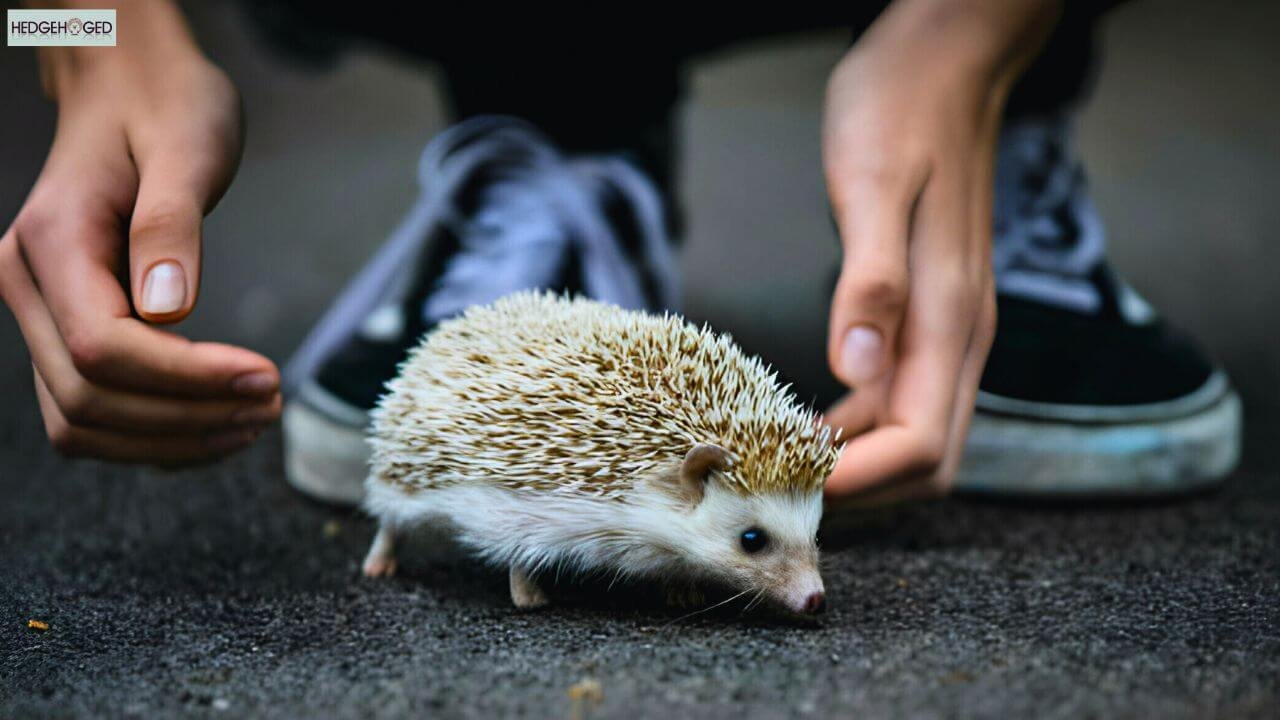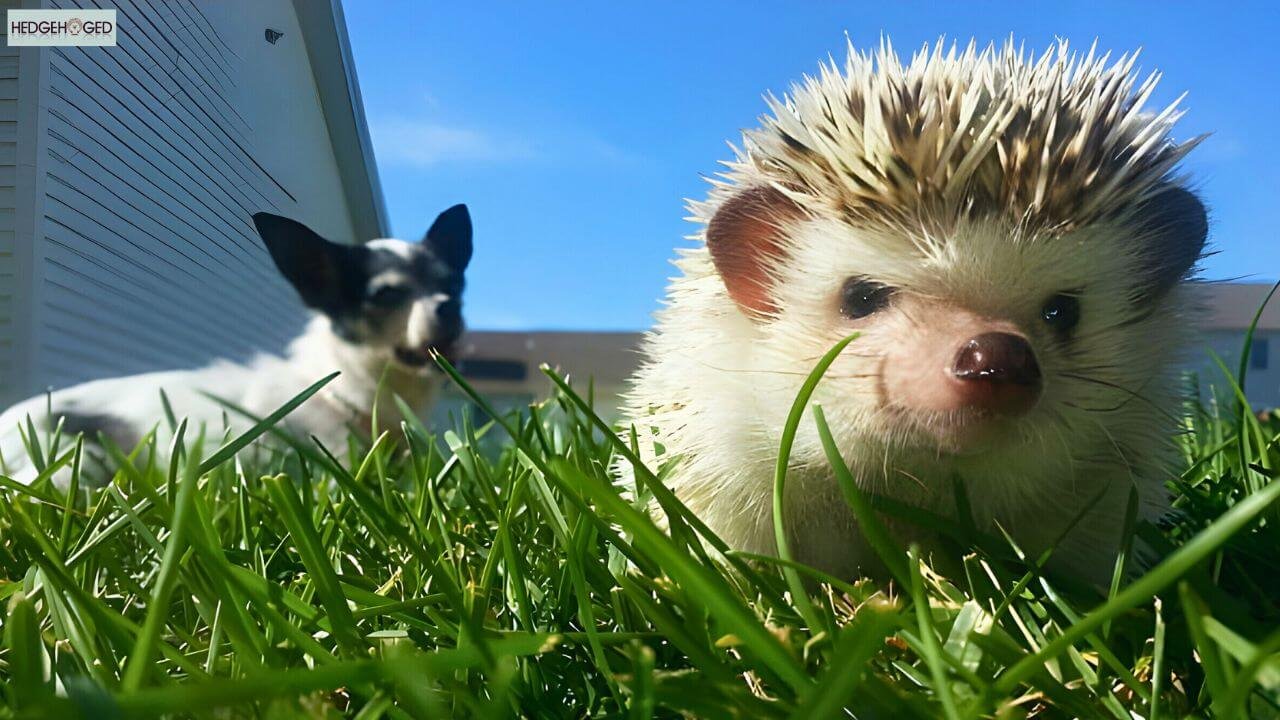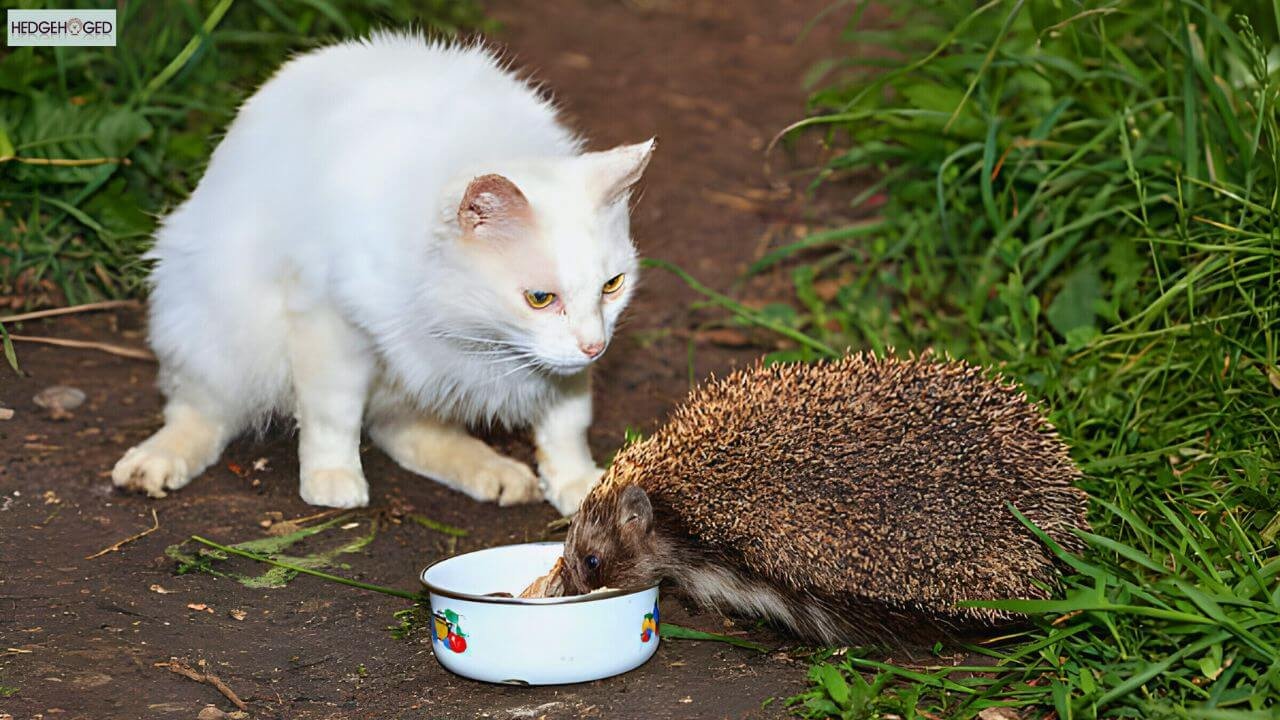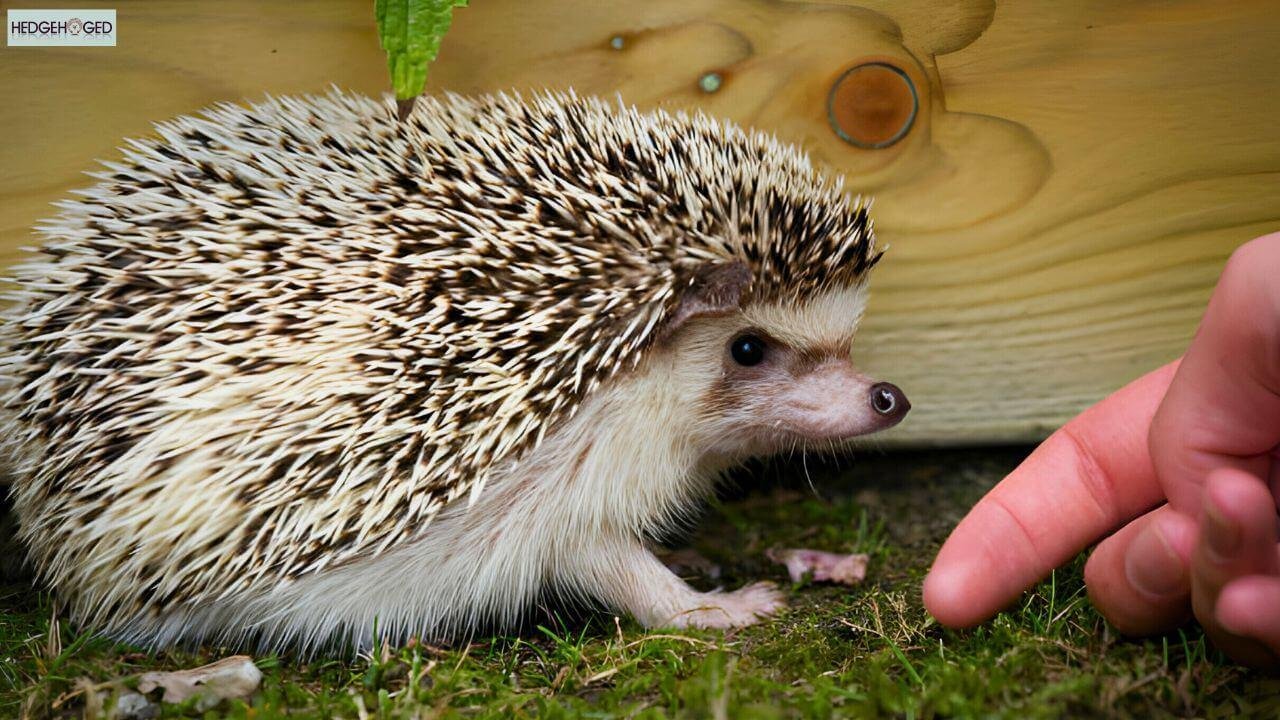Hedgehogs are captivating animals that win people over with their endearing looks and distinctive habits. However, concern is frequently raised about whether Are hedgehogs dangerous especially from the perspective of how they may interact with people and other animals.
Hedgehogs are typically not seen as dangerous to humans. They are little, afraid animals when challenged, curl into a protective ball rather than attack. Hedgehogs may bite, however this happens extremely rarely. This frequently occurs when they are young and believe your fingers will feed them (if they were fed with a syringe since they had no mother) but hedgehog bites are typically minor.
We’ll talk over common worries and offer information on hedgehog safety in a variety of scenarios in this extensive guide.
Are Hedgehogs Dangerous To Humans?
Hedgehogs don’t present a threat to people. Hedgehogs are not hostile creatures, and although they do have sharp quills for protection, it is doubtful that they will attack people without cause. A hedgehog would naturally curl into a ball and cover itself with its quills for protection if it feels threatened or scared.
The baby hedgehogs can’t bite very hard, and when I’ve been bitten, it feels more like a little grip around your finger than teeth cutting into your flesh. Mature hedgehogs have stronger teeth and two little front teeth that resemble rabbits and may penetrate the skin when they bite. They usually hang to you for a while, and if they bite you, you’ll have to get them free through some tugging.
They seldom bite, yet they are powerful enough to damage your skin with their teeth. Hedgehogs’ defense techniques, such as curling up into an extremely spiky ball and thrusting their needle spines out, can make them appear ugly. This makes them difficult to handle and indicates that they do not want to be disturbed.
When they don’t want something to go close to them, they also hiss and push their bodies upward, giving off the impression that they are about to sprint and smash you or anything around. However, if you approach the hedgehog while they’re hissing at you, they’ll normally curl up and keep doing so. A hedgehog uses its distress call as a means of warning off other animals that may pose a threat to them; it’s a vital defense mechanism.
However, hedgehogs must be handled with care and respect. Mishandling or scaring a hedgehog may result in it poking you with its quills, causing discomfort and minor injuries such as puncture wounds or scratches. To avoid this, approach hedgehogs softly and carefully, giving them time to adjust to your presence before attempting to handle them.
Are Hedgehogs Harmful to Dogs?
The dog faces more danger than the hedgehog when it comes to encounters between the two species. If a dog approaches a hedgehog aggressively, it may try to protect itself with its quills, but the main worry is that the hedgehog might get hurt. Hedgehogs may be accidentally harmed by a dog’s playful or inquisitive behavior, particularly if the hedgehog feels threatened and springs up into a protective ball.
If you own a dog and a hedgehog as pets, you need to keep an eye on them when they’re together. Provide a secure resting spot for the hedgehog in case it gets frightened. Make sure your dog understands the hedgehog’s kind nature and never leave them both alone without adult supervision.
Are Hedgehogs Dangerous to Cats?
Hedgehogs and cats can get along well enough given enough time and tolerance, but because they are solitary animals, it is doubtful that they will ever develop a close relationship. Although there aren’t many cat assaults on hedgehogs, cats are predators and shouldn’t be left alone with a hedgehog. Because of their amazing defensive mechanism, hedgehogs have a significant advantage over other tiny pets.
They may still easily become stressed out, though, because they are prey animals, which is bad for their welfare. They must, after all, protect themselves. Because hedgehogs are inherently leery of cats, it is important to introduce the two species very slowly and cautiously. It could take some time for your friends to get acquainted with one other because hedgehogs and cats are both recognized for their obstinately independent personalities.
When you factor in unique personalities and temperaments, you understand how important it is to constantly watch any interactions. Nonetheless, let us now examine the link between these two very distinct creatures and how you might be able to maintain them as pets.
Is Hedgehog Bite Dangerous?
Hedgehog bites are often not the reason for serious worry. Hedgehogs are not typically aggressive, although they may bite if they are afraid or confined. However, because hedgehogs have small teeth designed to devour insects and small food, their bites seldom cause major injury to people.
To stop any possible infection, it’s critical that you gently treat the hedgehog bite place with soap and water once it occurs. To keep the area clean and promote healing, use an antibacterial ointment. Even while the majority of hedgehog bites are rather mild and may just result in a small wound or some discomfort, it’s still vital to keep an eye out for any infection-related symptoms, such as redness, swelling, or rising pain.
If the wound seems deep or exhibits indications of infection, get medical assistance right once. A healthcare practitioner can evaluate the damage and provide appropriate therapy, such as antibiotics or further wound care measures, to avoid complications.
Overall, while hedgehog bites are seldom harmful, it is critical to treat these circumstances with caution and take proper actions to avoid infection and promote healing if a bite occurs.
Are Hedgehogs’ Spikes Dangerous?
Quills, or spikes, are the main defense mechanism used by hedgehogs against predators. These quills are not fundamentally harmful since they are made of keratin, the same substance that makes up human hair and nails. Hedgehogs can be difficult to manage because they can erect their quills or curl into a tight ball if mistreated or if they sense danger.
Hedgehog quills are not dangerous or venomous, although they can inflict pain if they pierce or prick the skin. To avoid injury, handle hedgehogs softly and carefully. Squeezing or squeezing their quills might make them more protective, potentially leading to inadvertent poking or scratching.
If a hedgehog’s quills come into touch with human skin, remain cool and delicately remove them without agitating the hedgehog. To avoid infection, thoroughly clean the afflicted area with soap and water. Minor hedgehog quill injuries might cause brief discomfort or irritation, but they seldom result in major injury.
To reduce the chance of inadvertent damage, approach hedgehogs quietly and gradually introduce them to human interaction. By following their natural habits and handling them carefully, the probability of facing problems with their quills is greatly minimized.
Ultimately, even though hedgehog quills are not essentially harmful, it’s crucial to treat these unusual animals with respect and care to protect both themselves and you. Hedgehog encounters can be delightful and enlightening between people and these interesting creatures when handled and cared for properly.
How to React when Your Hedgehog Bites You
If your hedgehog bites you, you must react calmly and cautiously. First and foremost, avoid making any unexpected movements or acts that may frighten or disturb the hedgehog. Take a minute to appraise the situation and determine the severity of the bite. If the bite is minimal and does not break the skin, carefully withdraw your hand from the hedgehog’s area to avoid further bites.
Avoid displaying anger or annoyance, as hedgehogs often bite out of fear or feeling in danger, and exhibiting hostility may exacerbate the problem. Instead, speak softly and reassuringly to the hedgehog to help it relax. After you’ve safely withdrawn yourself from the hedgehog’s reach, carefully inspect the afflicted region for symptoms of injury, such as redness, swelling, or blood.
To avoid infection, carefully clean the wound with soap and water before applying an antiseptic ointment. If the bite looks to be more serious, such as a broken skin or infection, get medical help right once.
Additionally, use this time to think back on what happened before the bite and brainstorm methods to keep it from happening again, such as giving your hedgehog a stress-free environment and avoiding loud noises or unexpected movements that might frighten it. You can reduce the chance of bites while still maintaining a positive relationship with your hedgehog by being patient, empathetic, and providing the right care.
Try Not To React Violently
If you respond too violently, you might accidentally damage your hedgehog. This might lead you to drop or throw your hedgehog. This is easier said than done, so try to keep your cool.
Never Hit or Flick your Hedgehog
This will not only injure your hedgehog but will also train it to dread you.
FAQs
Q1. Can hedgehogs transmit illnesses to people and other pets?
Hedgehogs can carry parasites and infections, but with good hygiene and care, disease transmission is unlikely. Regular veterinarian examinations and cleaning of their enclosures can help reduce health risks.
Q2. Can I own a hedgehog as a pet?
Hedgehog ownership restrictions differ by area. Before purchasing one, verify your local regulations, since some may require permissions or licenses.
Q3. How to make a safe environment where hedgehogs and other pets may coexist?
Provide distinct areas where each pet may hide out if necessary. Positive connections may be fostered through controlled encounters and gradual introductions.
Q4. What foods do hedgehogs consume as pets?
High-quality hedgehog food augmented with fruits, vegetables, and insects gives up a balanced diet. Make sure their food provides the nutrients they require.
Q5. How can I socialize my hedgehog to reduce aggressiveness and fear?
Slowly expose your hedgehog to human interaction, using brief, joyful handling moments. To gain their trust and keep them quiet, give sweets and praise while being gentle.
Conclusion
In conclusion, this article describes the common question, are hedgehogs dangerous? hedgehogs are not typically considered dangerous creatures, but they do require sensitive handling and respect for their limits. Patience and understanding are essential when interacting with people or other pets since they promote healthy connections and ensure everyone’s safety.
Hedgehog interactions may be joyful and instructive if you follow adequate care recommendations and are aware of their characteristics. Hedgehogs and other pets should live in a safe setting where they may coexist peacefully, and their welfare should always come first. Hedgehog ownership may be gratifying for both owners and their pets if the proper methods are used.





